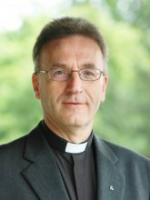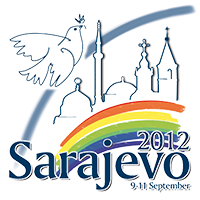
Presidente de Renovabis, Alemania
|
From 1992 till the beginning of 1996 the capital of Bosnia and Herzegovina was under siege, in total for 1425 days; it is estimated that nearly 12,000 civilians were killed or went missing in the city, including over 1,500 children. An additional 56,000 people were wounded, including almost 15,000 children.
During the war in Bosnia and Herzegovina more than 200.000 people were killed, about 60 % of the total population of the country was forced to leave their homes and to seek a refugee either in other parts of the country, in neighboring countries or in distant parts of the world. Although in the “Dayton Agreement” it was stated that everybody has the right to return to his home, a large number of people preferred to stay in other places, either in other parts of the country or abroad.
These few facts alone might be enough to describe, how deep and fundamental the conflicts seemed which either already existed before the outburst of violence of this war or which were created by the atrocities of the war in this city and in the whole country.
20 years after the war has come to an end – although it seems that it did not come to real peace - we are now coming together in this wonderful city at the World Meeting for Peace. I am convinced, that this is a proof of the fact, that people in this country and this specific town did not lose their capacity to leave at least open conflicts behind them, even if there are still many reasons to talk about persistent conflicts: Frequently there are media reports about still existing conflicts between different ethnic or religious groups, the frustrating and paralyzing administrative and political structures, economic standstill, corruption etc. - briefly all the factors, that prevent this country and this city from achieving real peace.
But we do not come together only to look back in anger or complain about doubtless existing problems. We gathered here to have a look at projects which are positive signs, hopeful projects that had been and are still carried on by individuals, groups and organizations who are challenging the common opinion that Bosnia and Herzegovina has no future – i.e. no future as a state composed of different ethnic groups and no future as a secure and prosperous haven for its people.
Going around in this city and in Bosnia and Herzegovina as a whole and having an open eye to many different projects we realize that - against all odds - a lot has been done.
As a representative of Renovabis, the Solidarity campaign of German Catholics with People in Central and Eastern Europe, I want to draw your attention to the schools which have been founded by our project partners under the Label of “Schools for Europe”(I am happy to see the spiritual and intellectual father of this concept, auxiliary bishop Dr. Pero Sudar among us): In six School Centers – all over the country - , actually nearly 6000 students, from an age of 5 or 6 years until to the age of 18 / 19 years are learning together irrespective of their social status and their ethnicity. In 1994, when the first School for Europe was founded right here in Sarajevo, the idea that young people from different ethnic groups would learn together and will be friends also in their leisure time, seemed unbelievable. Today, twenty years after, the Katolicke Skolske Centra are a model for the whole country.
Religion was and is still sometimes stated as one of the reasons for the past war in this country – I am not going to begin a debate about this issue – I can only state, that religious communities in Bosnia and Herzegovina contributed and still are contributing a lot to the reconstruction of this country, both materially and especially spiritually. Faith-based communities from all over the world made a tremendous effort that during the war and after the war life could continue and also that there were real prospects for the people to stay here.
I do not know in detail, how other organizations and institutions have contributed to normalize life here and in the whole country. Renovabis helped as well through the reconstruction of the pastoral infrastructure (which was largely damaged all over the country) and especially through opening new activities, giving positive prospectives to Catholics and to all people, who – in a holistic sense of the word - want to “reconstruct” their country.
Through all these years nearly 35 million Euros were invested by Renovabis to realize a total number of 450 projects of our partners; I am convinced that the money was well invested. The schools already mentioned (Schools for Europe) received a respectable share of this amount; but there are a numerous social projects like kindergartens, social centers, and projects for elderly people and for the economically weak, families – in short, nearly all those who were in difficult situations and could not help themselves. Nearly all these projects contributed to build up Civil Society. The financial support often served as starting point for initiatives which did not stop, when the money from outside stopped, but which continue to function by local financial resources – either from the respective communities or from public funding. I am happy that Renovabis was able to contribute to the development of prospectives of self-reliance and self-sustainability in this country.
After all, it is not primarily the help from outside which made a somehow positive development possible - it is the achievement of the people of Bosnia and Herzegovina. Without your common sense – although very often not recognized and estimated – even all of our efforts would have been futile.
Especially the younger generation that grew up during and after the war, reinforces our hope that you, the people of Bosnia and Herzegovina, will find your way to live together peacefully.
To all of you who – like myself - are guests from abroad I recommend that you take the chance during these days to go for a walk in this wonderful city of Sarajevo, maybe to have a coffee in one of the numerous bars and to discover that you will not be able to distinguish who belongs to which ethnic group; I think, that just observing young Bosnians in the streets of Sarajevo gives a vivid impression, how eager especially the young generation is to live together in harmony and mutual respect, inspired by a common desire to build on a just society and a prosperous future.
|

